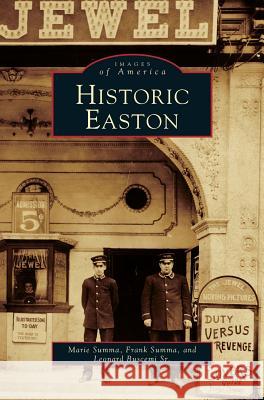Historic Easton » książka
Historic Easton
ISBN-13: 9781531603090 / Angielski / Twarda / 2000 / 130 str.
Easton is located in the Lehigh Valley, which was known long ago as the "Entrance to the Grand Valley." It is the seat of Northampton County, which contains part of Bethlehem and many nearby boroughs and townships. Its location at the confluence of two rivers and various creeks made it a prized position for commerce and early settlement. An early Native American camping site for council, war, and hunting
and fishing parties, it later became a major hub of government, industry, and culture. Historic Easton traces the evolution of a small frontier village to a large industrial center, spanning the years from the earliest settlements to the 1940s. At the dawn of its creation, Easton played a major role in the Walking Purchase of 1737. Later, Easton was the location of talks to end the French and Indian and the Revolutionary Wars. Notable figures, such as Benjamin
Franklin, Teedyuscung, William Parsons, John Sullivan, and George Taylor, met to discuss the politics of these wars. By the early nineteenth century, Easton had become one of the first industrial centers in the region. By the time the city was incorporated in 1887, nearly eleven thousand people called Easton home.
Easton is located in the Lehigh Valley, which was known long ago as the "Entrance to the Grand Valley." It is the seat of Northampton County, which contains part of Bethlehem and many nearby boroughs and townships. Its location at the confluence of two rivers and various creeks made it a prized position for commerce and early settlement. An early Native American camping site for council, war, and hunting
and fishing parties, it later became a major hub of government, industry, and culture. Historic Easton traces the evolution of a small frontier village to a large industrial center, spanning the years from the earliest settlements to the 1940s. At the dawn of its creation, Easton played a major role in the Walking Purchase of 1737. Later, Easton was the location of talks to end the French and Indian and the Revolutionary Wars. Notable figures, such as Benjamin
Franklin, Teedyuscung, William Parsons, John Sullivan, and George Taylor, met to discuss the politics of these wars. By the early nineteenth century, Easton had become one of the first industrial centers in the region. By the time the city was incorporated in 1887, nearly eleven thousand people called Easton home.











